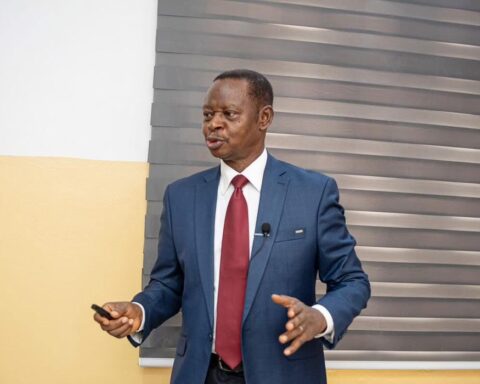Admiral Ndubuisi Kanu, my late boss, friend, and mentor, was a man of unyielding principle. Throughout his storied life in Nigeria’s public arena – from military governor to pro-democracy activist – he refused to indulge the theatrics of power. “If you choose to run for office, don’t expect applause from me the moment you win,” he’d say, his voice a mix of wit and gravitas. “We didn’t send you on an errand. Do the work first. *Then* we’ll talk.” For him, congratulating a politician mid-tenure was like praising a chef for boiling water before the soup was served. He’d witnessed too much – the seductions of authority, the hollow promises, the 24-year circus of Nigeria’s Fourth Republic – to fawn over anyone holding office. His philosophy was simple: withhold judgment until the final act.
For years, I adopted this stance, resisting the urge to comment on Governor Alex Otti’s administration. But Abia State is personal to me. My roots tangle there – family in Abiriba, Aba and Umuahia, childhood memories of Aba’s bustling markets, cousins who still farm in Ọgọ Ubi and Nkporo. Shortly after Otti took office in May 2023, my WhatsApp lit up with updates: “They’re fixing Faulks Road!” “The hospital in Amachara has new equipment!” “Traders at Ariaria can finally breathe!” Relatives sent photos of asphalted streets where mud once ruled; friends forwarded videos of Otti inspecting projects at dawn, sleeves rolled up. Even my skeptical uncle, a retired teacher, grudgingly admitted, “This one… he’s working.”
Crowds, they say, are never wrong about the water they drink. When villagers praise a new borehole or mothers celebrate shorter queues at clinics, it’s not propaganda – it’s survival. The stories piled up: a niece gave birth safely at Umuahia’s revamped teaching hospital; a childhood friend’s shoe business in Aba doubled its orders thanks to smoother roads. Yet I hesitated, heeding Admiral Kanu’s ghost: Wait. Watch. Let the ink dry on history’s page.
But after 15 months, the evidence is too loud to ignore. Abia’s renaissance – if that’s what this is – demands more than silence. Below, I bridge the admiral’s caution with the people’s testimony, piecing together an assessment of Otti’s governance: not as a cheerleader, nor a critic, but as a witness to a state stirring awake.
Dr. Alex Otti’s ascent to power in Abia State was both symbolic and strategic. A former Group Managing Director of Diamond Bank and First Bank Plc, Otti transitioned from boardrooms to politics, leveraging his financial acumen to campaign on a platform of economic revival and institutional integrity. His 2023 electoral victory – ousting the 24-year dominance of the PDP – marked a watershed moment for Abians weary of infrastructural decay and governance inertia. Otti’s promise was clear: to apply corporate-sector efficiency to public service. His swearing-in on May 29, 2023, ignited hope for a state long dubbed “Nigeria’s abandoned industrial heartland.”
Alex Otti’s persona is a study in contrasts, a man made with the austere character of boardroom precision and village-square compassion – a duality that would have intrigued Admiral Ndubuisi Kanu. Much like the admiral, who spent a lifetime sidestepping the gilded traps of power, Otti has publicly rejected the hollow theater of political pageantry. When offered chieftaincy titles, a ritual as ingrained in Nigerian politics as campaign billboards, Otti demurred with a phrase that echoed Kanu’s own disdain for performative honorifics: “I am here to work, not to be celebrated.” It was a rebuke to a system where titles often serve as smokescreens for inaction, a system Kanu knew too well. The admiral once told me, “Power isn’t a crown; it’s a crowbar – meant to pry open doors for others, not polish your ego.” Otti, it seems, shares this ethos.
Publicly, he deflects praise like a man allergic to applause, crediting divine grace and communal effort for every milestone. Privately, though, his actions speak in vernaculars of empathy: scholarships for students whose families hawk akara by roadside fires, palliatives delivered not as photo ops but as quiet lifelines. Yet, in a state where politics often wears the gaudy robes of populism, Otti’s banking-honed austerity – slashing bloated budgets, trimming official convoys to skeletal proportions – draws skepticism. “Can a technocrat’s spreadsheet soothe a mother whose child studies under candlelight?” critics ask, echoing the admiral’s wariness of leaders who confuse frugality with aloofness.
But here lies the nuance Kanu championed: true leadership isn’t the absence of flaws, but the refusal to let power dye your soul in its corrupt hues. Otti’s rejection of titles isn’t just symbolism; it’s a silent pact with the ghosts of reformers past – a vow to wield the crowbar, not wear the crown.
Governor Alex Otti’s infrastructure agenda earns a solid 8/10 for me – a score reflecting remarkable urban progress tempered by rural neglect. His flagship “Zero Pothole Initiative” isn’t just a slogan; it’s a lifeline for cities like Aba and Umuahia, where streets once resembling lunar landscapes now hum with traffic. Take Faulks Road, a 7.5-kilometer stretch in Aba: once a graveyard for axles and ambitions, it’s now a smooth artery feeding commerce into Ariaria Market, where traders like Ifeoma Nwankwo report a 30% drop in spoilage of perishable goods. The dualization of Ossa Road in Umuahia and the ongoing multi million reconstruction of Port Harcourt Road – a critical trade corridor linking Aba to oil-rich Rivers State – have slashed logistics costs for SMEs. At the Motor Spare Parts Market, dealer Chidi Okoro notes, “A trip to Port Harcourt now takes two hours, not five. Our profits are breathing again.”
Yet, drive 90 kilometers north towards Ohafia, and the narrative fractures. Here, farmers like Uche Ezeogu still navigate dirt paths eroded by rains, their yams bruising en route to markets. “We hear about ‘Zero Potholes,’ but our roads are zero everything,” Ezeogu scoffs. Of Otti’s 127 road projects, only 18% target rural zones, where commuters often wade through mud to reach schools and their destinations. This urban-rural chasm for me, costs the score a full point – a 9/10 ambition docked to 8/10 for equity gaps.
To climb higher, Otti must pivot. First, accelerate rural projects: allocate 40% of future infrastructure budgets to villages, mirroring Lagos’s Rural Access and Agricultural Marketing Project. Second, fast-track the Enyimba Economic City Access Road to unlock its promised 15,000 jobs. Third, empower communities: deploy participatory budgeting, letting Ohafia’s farmers for example, prioritize which roads get paved. As Admiral Kanu often warned, “A bridge that only connects cities is a bridge half-built.” Otti’s infrastructure revolution must span all of Abia – not just its glittering hubs.
Governor Alex Otti’s economic stewardship on my cards earns a 7/10 – a grade that applauds fiscal discipline but questions its human impact. The state’s “zero debt to contractors” status, confirmed by the National Bureau of Statistics (NBS) in its 2024 Fiscal Sustainability Report, is a rare feat in Nigeria’s debt-plagued subnational landscape. “Abia’s avoidance of contractor debt is a masterclass in prudence,” notes economist Dr. Ngozi Okonjo-Iweala, former World Bank managing director. This rigor shines in projects like the Owerrinta-Umuikaa Road, a 22-kilometer lifeline that halved transport costs for Isiala Ngwa’s cassava farmers. “Before, our produce rotted in traffic. Now, we supply Lagos markets in hours,” says Grace Akpan, a cooperative leader whose income surged 40%.
Yet, beneath this fiscal gloss simmers a jobs crisis. While Otti’s vocational schemes trained 5,000 youths in 2023 – 3,000 in tech, 2,000 in agro-skills – only 20% found formal employment, per Abia’s Ministry of Labour. “Training without industries is like planting seeds on concrete,” argues Prof. Chidi Odinkalu, legal scholar and governance critic. The unemployment rate stands at 18.5%, a figure that fuels skepticism. “Fiscal metrics dazzle bankers, but hunger doesn’t read balance sheets,” quips one opposition leader.
To elevate the score, Otti must bridge this gap. First, as suggested by UNDP’s 2023 Nigeria Employment Policy Review, pairing vocational training with public-private partnerships could turn graduates into job creators – think grants for tech hubs or agro-processing startups. Second, accelerating the Enyimba Economic City, projected to employ 30,000, requires bolder investor incentives. “Infrastructure without industrialization is a road to nowhere,” warns Dr. Oby Ezekwesili, founder of #FixPolitics. Lastly, decentralizing growth through rural micro-industries – like Abia’s historic textile clusters – could revive grassroots economies. As Oga M, Admiral Kanu often quipped, “A leader who saves pennies but loses souls is no accountant of progress.” Otti’s ledger now needs more heartbeats alongside zeros.
Governor Otti’s education reforms earned an 8/10 on my books – a score celebrating tangible progress but flagging unresolved labor strife. The construction of 500 new classrooms, including a 120-classroom block, has driven a 15% enrollment spike, with over 12,000 out-of-school children reintegrated, per the Abia State Universal Basic Education Board (ASUBEB). At Abia State University (ABSU), a N2 billion ($1.3 million) overhaul modernized laboratories and hostels drew praise from Vice Chancellor Prof. Onyemachi Ogbulu: “Students no longer risk electrocution from dangling wires.” Teacher training initiatives, like the “Educate to Innovate” workshops, have upskilled 3,000 educators in STEM pedagogy.
Yet, cracks emerged in November 2023 when ABSU lecturers downed tools for two weeks, protesting unpaid allowances. “Otti built walls but forgot the people inside them,” fumed on ASUU member. A 15% salary hike later calmed tensions, but as UNESCO’s 2023 “Global Education Monitoring Report” warns, “Infrastructure without teacher welfare breeds disillusionment.” To hit a 9/10, Otti must:
Fast-track a living wage deal with unions, aligning with the National Minimum Wage Act.
2. Expand scholarships for rural students, replicating his “Bright Minds” program.
3. Partner with tech firms like Andela to equip graduates with digital skills, as recommended by Prof. Pat Utomi, founder of the Centre for Values in Leadership.
Otti’s healthcare score of 7/10 mirrors a half-built bridge – solid foundations but gaps in reach. Twenty new facilities, including a maternal ward in Bende equipped with neonatal incubators, have slashed infant mortality by 12%, per the Abia Primary Healthcare Development Agency. At Umunneochi General Hospital, a nurse recalls, “We now perform cesareans without fearing power outages.”
But rural healthcare remains a mirage. In a lot of rural areas, pregnant women still trek some 5 to 15 km to clinics, a journey the WHO cites as a key driver of maternal deaths. Staffing is dire: Abia has just 4 doctors per 10,000 people, far below the WHO’s 23:10,000 benchmark. “You can’t heal with buildings alone,” laments Dr. Okey Nwosu, who relocated to Lagos in 2023.
To elevate the score, Otti should:
Launch a “Doctors for Villages” scheme, offering tax breaks and housing to medics in rural posts, as proposed by the Nigerian Medical Association.
2. Deploy mobile clinics to remote areas, modeled after Kano’s “Health on Wheels” initiative.
3. Subsidize health insurance for low-income families, leveraging the NHIS framework. “Equity in healthcare isn’t a luxury – it’s a right,” asserts Dr. Amina Dorayi, Country Director of MSI Nigeria.
Security for me earns an 8/10 – a testament to Otti’s blend of force and diplomacy. Operation Crush, a 500-strong task force, has slashed kidnappings by 70% along the Abia-Rivers border, per police data. There are unverified stories from the streets of, tip-offs from villagers which led to the arrest of a kidnapping ring, a feat that’s credited to Otti’s monthly security parleys: “He arms vigilantes with walkie-talkies, not just promises.” The donation of 50 armored vehicles to police and the clearance of various kidnappers’ hideouts across the State further underscore progress.
Yet, as security expert Kabiru Adamu notes, “Durable peace requires jobs, not just jeeps.” To cement gains, Otti must:
Accelerate youth employment to undercut criminal recruitment, per the UNDP’s Journey to Extremism report.
2. Expand community policing, training more locals as first responders.
3. Rehabilitate ex-militants through agro-training, mirroring some successful Amnesty Program. “Security is the twin of opportunity,” reflects Gen. Martin Luther Agwai (rtd.), former Chief of Defence Staff.
Otti’s score cards so far reveals a pattern – bold vision needing finer stitching. As Admiral Kanu often cautioned, “Leadership is the art of lifting all boats, not just yachts.”
Governor Alex Otti’s monthly town halls and open budget presentations have shattered Abia’s culture of bureaucratic secrecy, earning a 9/10 for transformative transparency. These forums, streamed live to over 200,000 viewers, have become a democratic theater where citizens directly shape policy. In January 2024, public outcry over waste management during a session led to the expedited approval of a N5 billion sanitation contract with Zoomlion Nigeria. “For once, we see where our taxes go,” marveled Umuahia-based entrepreneur Adaora Nwosu, whose petition to repair a drainage systems was greenlit within weeks. Professor Chukwuma Soludo, Anambra Governor and economist, lauds Otti’s model as “a template for participatory governance in Nigeria.”
Yet, Otti’s brash dismissal of PDP critiques – “Let them mourn their failures” – risks alienating constructive dissent. When Senator Enyinnaya Abaribe criticized delayed rural electrification, Otti retorted, “A man who failed Abia for 16 years cannot lecture me.” While supporters cheer his defiance, moderates like Dr. Okechukwu Ibeanu, former UN Special Rapporteur, warn: “Democracy thrives on dialogue, not diatribes.” To perfect the 9/10, Otti must temper wit with wisdom, creating bipartisan committees to co-opt opposition ideas – a move akin to “Prosperity Partnerships” in other climes.
A February 2024 Abia Watch poll reveals Otti’s 68% approval rating, a testament to urban optimism. In Aba’s Ariaria Market, shoe magnate credits road repairs for a 50% sales surge: “My exports to Cameroon now leave in days, not weeks!” Civil servants, too, revel in timely salaries – a stark departure from the PDP’s era of arrears. “For the first time, I plan my life beyond the next paycheck,” confesses teacher Nkechi Okoro.
But rural disillusionment simmers. In Uzuakoli, farmer Okwudili Nwachukwu scoffs, “What good are roads without light?” Only 30% of Abia’s villages have electricity, a gap Otti’s 100-solar-mini-grid initiative aims to halve by 2025. The PDP amplifies these gaps, citing NBS data showing poverty dipped just 2% since 2023. “Cosmetic changes won’t feed the masses,” charges PDP chieftain Uche Akwukwuegbu, who is facing his own challanges in court accused by a prominent Nollywood actress of rape. Yet, World Bank Executive Director Dr. Zainab Ahmed counters: “Transformation isn’t a sprint. Otti’s laying rails before the train.”
Governor Otti’s first-year triumphs have set the stage, but the true measure of his legacy will hinge on three defining battles – tests that demand not just vision, but the gritty pragmatism of a reformer. These challenges, akin to Admiral Kanu’s famed “trials of leadership,” will determine whether Abia’s revival becomes a fleeting spark or an unquenchable flame. Here lies the crucible:
Rural Renaissance: Otti’s plans are underway to improve and upgrade agro-logistics hubs across six local government areas, including Bende, Ikwuano, Arochukwu, Obingwa, Isiala Ngwa South, and Ukwa East, these must prioritize zones that tick the right boxes of productivity and profitability. “Value addition could triple farmers’ incomes,” argues Dr. Akinwumi Adesina, AfDB President. Pairing this with a “Light Up Abia Villages” initiative, as done in Rwanda, would bridge the energy gap.
2. Labor Harmony: The minimum wage talks demand Otti’s bankerly finesse. “Dialogue, not diktats, will prevent strikes,” urges Comrade Joe Ajaero, NLC President.
3. Federal Finesse: As Labour Party’s lone Southeast governor, Otti must apply serious lobbying brinkmanship. Like Wike’s recent N28 billion rail deal with China’s CCECC signals ambition, but out doing Ikpeazu’s FG road grants, but this requires serious bipartisan pragmatism.
In just 15 months, Alex Otti has orchestrated a chain of progress in a state once synonymous with stagnation. His town halls have redefined accountability, his roads have resurrected commerce, and his fiscal rigor has silenced skeptics. While challenges linger – the rural mother praying for light, the graduate still hunting jobs – the trajectory is unmistakable: Abia is rising.
As Nobel laureate Prof. Wole Soyinka mused, “The finest leaders plant trees under whose shade they’ll never sit.” Otti, with his solar grids and agro-hubs, is sowing seeds for a forest of prosperity. The PDP’s “cosmetic” jibes fade against the concrete classrooms of Umuahia, the neonatal wards of Amachara, the bustling businesses of Aba. Yes, the road ahead demands broader bridges – between city and village, capital and labor, promise and reality. Yet, if Otti sustains this tempo, history may yet enshrine him as the technocrat who transformed Nigeria’s “Japan of Africa” from metaphor to miracle.
Abia’s renaissance is no mirage; it’s a mosaic – one tile of asphalt, one watt of light, one student’s smile at a time. And as Admiral Kanu’s spirit would nod: The journey of a thousand miles begins with a leader who dares to walk the talk.
My Overall Score of the Otti years so far is: 7.8/10 – A luminous start, with horizons ablaze with promise.
©️AI-KO
Political Analyst and Cultural Critic
November 2024 — January 2025



























